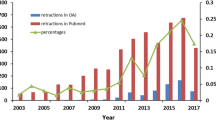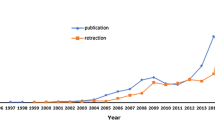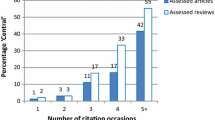Abstract
We describe the ongoing citations to biomedical articles affected by scientific misconduct, and characterize the papers that cite these affected articles. The citations to 102 articles named in official findings of scientific misconduct during the period of 1993 and 2001 were identified through the Institute for Scientific Information Web of Science database. Using a stratified random sampling strategy, we performed a content analysis of 603 of the 5,393 citing papers to identify indications of awareness that the cited articles affected by scientific misconduct had validity issues, and to examine how the citing papers referred to the affected articles. Fewer than 5% of citing papers indicated any awareness that the cited article was retracted or named in a finding of misconduct. We also tested the hypothesis that affected articles would have fewer citations than a comparison sample; this was not supported. Most articles affected by misconduct were published in basic science journals, and we found little cause for concern that such articles may have affected clinical equipoise or clinical care.
Similar content being viewed by others
References
Atlas, M. C. (2004). Retraction policies of high-impact biomedical journals. Journal of the Medical Library Association, 92, 242–250.
Benos, D. J., Fabres, J., Farmer, J., Gutierrez, J. P., Hennessy, K., Kosek, D., et al. (2005). Ethics and scientific publication. Advances in Physiology Education, 29, 59–74.
Budd, J. M., Sievert, M., & Schultz, T. R. (1998). Phenomena of retraction: Reasons for retraction and citations to the publications. Journal of the American Medical Association, 280, 296–297.
Budd, J. M., Sievert, M., Schultz, T. R., & Scoville, C. (1999). Effects of article retraction on citation and practice in medicine. Bulletin of the Medical Library Association, 87, 437–443.
Buhles, W. C., & Starnes, H. F. (1992). Retraction: Effects of interleukin-1 on platelet counts. The Lancet, 340, 496.
Caen, J. P., & Han, Z. C. (1993). Control of megakaryocyte development: From basic data to clinical results. Comptes Rendus de l’Academie des Sciences. Série III, Sciences de la vie, 316, 925–930.
Cokol, M., Iossifov, I., & Rodriguez-Esteban, R. (2007). How many scientific papers should be retracted? European Molecular Biology Organization (EMBO) Reports, 8, 422–423.
Cokol, M., Ozbay, F., & Rodriguez-Esteban, R. (2008). Retraction rates are on the rise. EMBO Reports, 9, 2.
Couzin, J. (2006). Stem cells…and how the problems eluded peer reviewers and editors. Science, 311, 23–24.
Couzin, J., & Unger, K. (2006). Scientific misconduct. Cleaning up the paper trail. Science, 312, 38–43.
Friedman, P. J. (1990). Correcting the literature following fraudulent publication. Journal of the American Medical Association, 263, 1416–1419.
Gardner, W., Lidz, C. W., & Hartwig, K. C. (2005). Authors’ reports about research integrity problems in clinical trials. Contemporary Clinical Trials, 26, 244–251.
Garfield, E., McVeigh, M., & Muff, M. (2006). Re: Research misconduct, retraction, and cleansing the medical literature: Lessons from the Poehlman case. Annals of Internal Medicine, 145, 472–473.
Garfield, E., & Welljams-Dorof, A. (1990). The impact of fraudulent research on the scientific literature. The Stephen E. Breuning case. JAMA, 263(10),1424–1426.
Horton, R. (1999). Scientific misconduct: Exaggerated fear but still real and requiring a proportionate response. The Lancet, 354(9172), 7–8.
Katz, T. J. (2006). Propagation of errors in review articles. Science, 313, 1236.
Maier, S. F., & Watkins, L. R. (1999). Bidirectional communication between the brain and the immune system: Implications for behaviour. Animal Behaviour, 57, 741–751.
Nath, S. B., Marcus, S. C., & Druss, B. G. (2006). Retractions in the research literature: Misconduct or mistakes? Medical Journal of Australia, 185, 152–154.
National Comprehensive Cancer Network, Inc. (2009). NCCN Clinical Practice Guidelines in Oncology™ (v.1.2009, 09/10/08) [website]. http://www.nccn.org. Accessed 1 Jan 2009.
National Library of Medicine. (2008). Fact sheet. Errata, retractions, partial retractions, corrected and republished articles, duplicate publications, comments (including author replies), updates, patient summaries, and republished (reprinted) articles policy for MEDLINE (updated 10/08/2008) [website]. http://www.nlm.nih.gov/pubs/factsheets/errata.html. Accessed 12 Jan 2009.
Neale, A. V., Northrup, J., Dailey, R., Marks, E., & Abrams, J. (2007). Correction and use of literature affected by scientific misconduct. Science and Engineering Ethics,13, 5–24.
Norton, M. L., & Saltman, D. C. (2007). Corrections in an electronic environment. BMC Medicine, 5, 4.
Parrish, D. M. (1999). Scientific misconduct and correcting the scientific literature. Academic Medicine, 72, 221–230.
Pfeifer, M. P., & Snodgrass, G. L. (1990). The continued use of retracted, invalid scientific literature. Journal of the American Medical Association, 263, 1420–1423.
Pfeifer, M. P., & Snodgrass, G. L. (1992). Medical school libraries’ handling of articles that report invalid science. Academic Medicine, 67, 109–113.
Poulton, A. (2007). Mistakes and misconduct in the research literature: Retractions just the tip of the iceberg. Medical Journal of Australia, 186, 323–324.
Roberts, I., Smith, R., & Evans, S. (2007). Doubts over head injury studies. British Medical Journal, 334, 392–394.
Snodgrass, G. L., & Pfeifer, M. P. (1992). The characteristics of medical retraction notices. Bulletin of the Medical Library Association, 80, 328–334.
Sox, H. C., & Rennie, D. (2006). Research misconduct, retraction, and cleansing the medical literature: Lessons from the Poehlman case. Annals of Internal Medicine, 144, 609–613.
Tewari, A., Buhles, W. C., Jr., & Starnes, H. F., Jr. (1990). Preliminary report: Effects of interleukin-1 on platelet counts. The Lancet, 336, 712–714.
Thomson Reuters. (2009). Institute for Scientific Information Web of Science [website]. Available at http://isiknowledge.com/WOS. Accessed 14 Jan 2009.
Tobin, M. J. (2000). Reporting research, retraction of results, and responsibility. American Journal of Respiratory and Critical Care Medicine, 162, 773–774.
Whitsett, C. F. (1995). The role of hematopoietic growth factors in transfusion medicine. Transfusion Medicine II. Hematology/Oncology Clinics of North America, 9, 23–68.
Zauli, G., & Catani, L. (1995). Human megakaryocyte biology and parthophysiology. Critical Reviews in Oncology/hematology, 21, 135–157.
Acknowledgments
This research was supported by the Research on Research Integrity Program, on ORI/NIH collaboration, grant # R01 NS44487. We are grateful for the contributions of the study coordinator Justin Northrup, MPT, and Daniel Sapeika, MS, MD who performed the content analysis.
Author information
Authors and Affiliations
Corresponding author
Rights and permissions
About this article
Cite this article
Neale, A.V., Dailey, R.K. & Abrams, J. Analysis of Citations to Biomedical Articles Affected by Scientific Misconduct. Sci Eng Ethics 16, 251–261 (2010). https://doi.org/10.1007/s11948-009-9151-4
Received:
Accepted:
Published:
Issue Date:
DOI: https://doi.org/10.1007/s11948-009-9151-4




